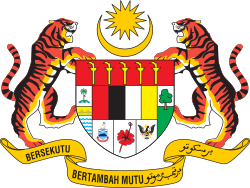 |
|---|
Heads of government in Malaysia's many states take on various titles. Nine of the states in the Peninsular who each have historical monarchs are known as the Menteri Besar [langnotes 1] (Jawi: منتري بسر, literally Grand Minister or First Minister ; abbreviated as MB), while the rest in the federation are titled Chief Minister (abbreviated as CM; in Malay: Ketua Menteri; abbreviated as KM). Until 2022, the head of government of Sarawak was also styled as the Chief Minister, thereafter it was changed to Premier ( Premier ).
Contents
- Background
- Relations between the Menteris Besar, chief ministers, premier and other levels of government
- Selection process
- Eligibility
- Election
- Oath
- Remuneration
- Present Menteris Besar, chief ministers and premier
- Timeline
- See also
- Notes
- References
The nine hereditary rulers of the Malay states and the appointed governors of the other four states serve as constitutional and ceremonial heads of their states, while the state executive authority rests with the Menteris Besar, chief ministers and premier. Following elections to the state legislative assembly, the ruler or governor usually invites the party (or coalition) with a majority of seats to form the state government. The ruler or governor appoints and swears in the Menteri Besar, chief ministers and premier, whose executive council (or Cabinet in Sabah and Sarawak) are collectively responsible to the assembly. Based on the Westminster system, given that he retains the confidence of the assembly, the terms of Menteris Besar, chief ministers and premier can last for the length of the assembly's life—a maximum of five years. There are no limits to the number of terms that the Menteri Besar, chief minister and premier can serve.













